增词和减词
- 格式:docx
- 大小:24.63 KB
- 文档页数:8
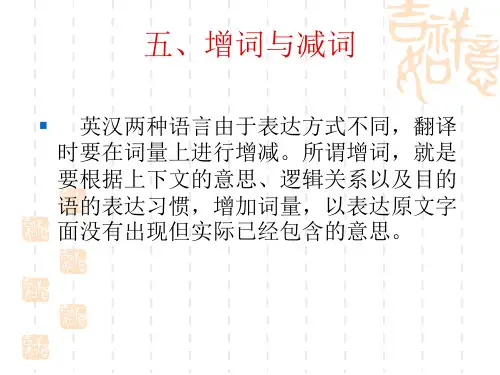
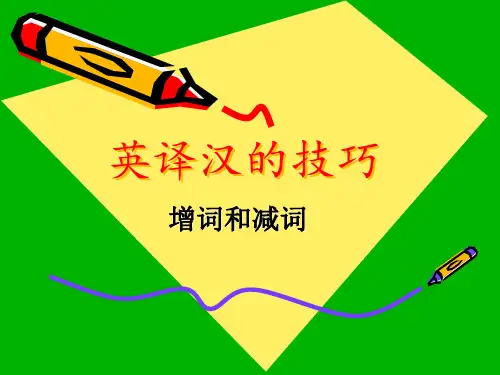
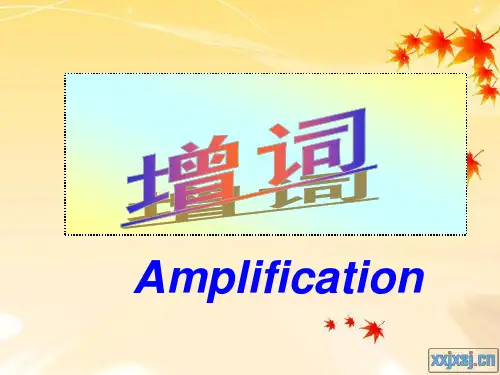
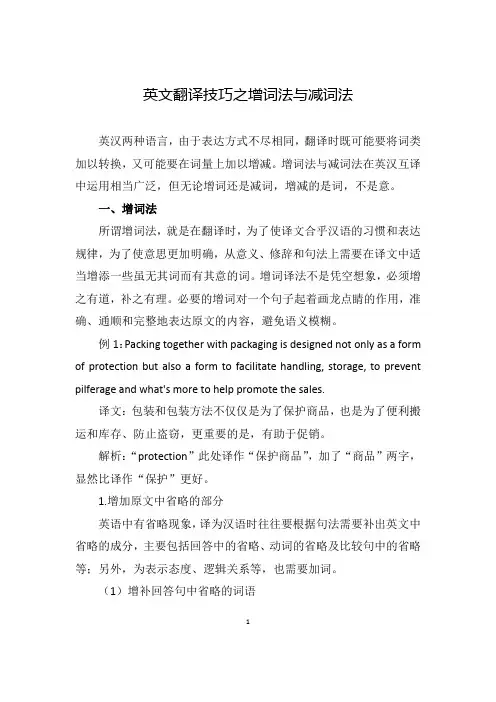
英文翻译技巧之增词法与减词法英汉两种语言,由于表达方式不尽相同,翻译时既可能要将词类加以转换,又可能要在词量上加以增减。
增词法与减词法在英汉互译中运用相当广泛,但无论增词还是减词,增减的是词,不是意。
一、增词法所谓增词法,就是在翻译时,为了使译文合乎汉语的习惯和表达规律,为了使意思更加明确,从意义、修辞和句法上需要在译文中适当增添一些虽无其词而有其意的词。
增词译法不是凭空想象,必须增之有道,补之有理。
必要的增词对一个句子起着画龙点睛的作用,准确、通顺和完整地表达原文的内容,避免语义模糊。
例1:Packing together with packaging is designed not only as a form of protection but also a form to facilitate handling, storage, to prevent pilferage and what's more to help promote the sales.译文:包装和包装方法不仅仅是为了保护商品,也是为了便利搬运和库存、防止盗窃,更重要的是,有助于促销。
解析:“protection”此处译作“保护商品”,加了“商品”两字,显然比译作“保护”更好。
1.增加原文中省略的部分英语中有省略现象,译为汉语时往往要根据句法需要补出英文中省略的成分,主要包括回答中的省略、动词的省略及比较句中的省略等;另外,为表示态度、逻辑关系等,也需要加词。
(1)增补回答句中省略的词语1例2:—He doesn’t know, does he?—Yes, he does.译文:——他不知道吧?——不,他知道。
例3:—Did you enjoy your time in Beijing?—Yes, I did.译文:——你在北京过得愉快吗?——是的,我过得很愉快。
(2)增补并列结构中省略的词语例4:On average, the economy performs less well in a president's second term than in his first.That pattern probably does not apply to Mr Obama. Since his first term was so difficult, the next, by rights, ought to be better.译文:一般来说,美国总统第二个任期内的经济不如第一任期。

有人误以为,所谓合乎翻译标准,就是在把一种语言转换为另一种语言时,做到“不增不减”。
翻译实践告诉我们,由于两种语言表达方式上存在差异,翻译时往往都是“既增又减”。
这种根据各自语言特点,在具体上下文中适当地“增、减”,就是我们所要讨论的翻译技巧。
词量增减,是指根据原文上下文的意思、逻辑关系以及译文语言句法特点和表达习惯,在翻译时增加原文字面没有出现但实际内容已包含的词,或者减去原文虽有但译文语言表达用不着的词。
必须指出的是,词量增减必须防止两个倾向:一是添枝加叶,任意发挥;二是避难就易,肆意裁割。
1、增词增词,从理论上说可以增加任何词,但在什么时候增加什么样的词,才能恰到好处,而不超出一定界限,则需要悉心体会。
下面试分析几个译例:1)A book, tight shut, is but a block of paper.译文一:一本书,紧紧合上,只是一叠纸。
译文二:一本书,如果紧紧合上不读,只是一叠纸。
译文三:一本书,如果紧紧合上不读,只是一叠废纸。
译文四:闲置之书只是一叠废纸。
上面同一个句子四个译文,可以体现翻译不同层次。
译文一,与原文似乎丝丝入扣,但却显得支离破碎、关系不清、语意不足;译文二,增加了“如果……不读”,意思明白无误,只是觉得言犹未尽;译文三,又增加了一个废字,这可是点睛之举。
能否译出这个废字,是翻译这个句子的关键。
一个废字,说话者语意才得以充分表达。
译文三不足之处,就是行文拖沓累赘;而译文四则简明扼要,笔酣墨浓了。
2)Success is often just an idea away.译文一:成功往往只是一个念头的距离。
译文二:成功往往只是一念之差。
译文三:成功与否往往只是一念之差。
译文一让人看后莫名其妙;译文二改变说法,但仍让人似懂非懂,而译文三只是简简单单增加了一个“与否”,但却使人豁然开朗!原句意思表达得淋漓尽致。
如同文学翻译一样,经贸文字翻译增词现象也是千变万化。
下面实例可供学习者体会增词原理和技巧。
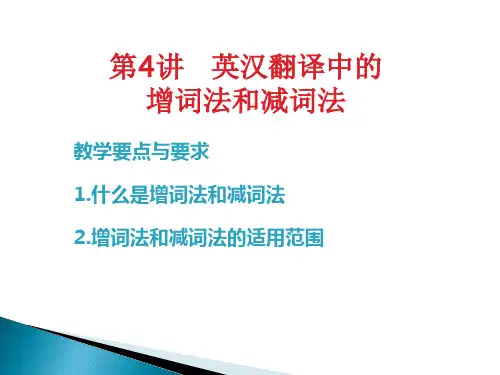
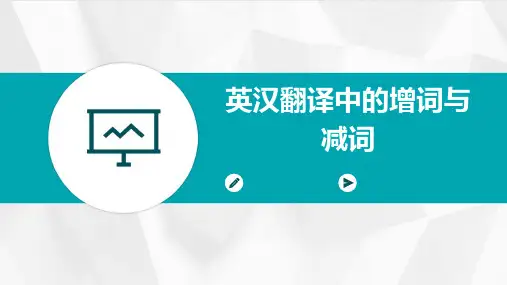
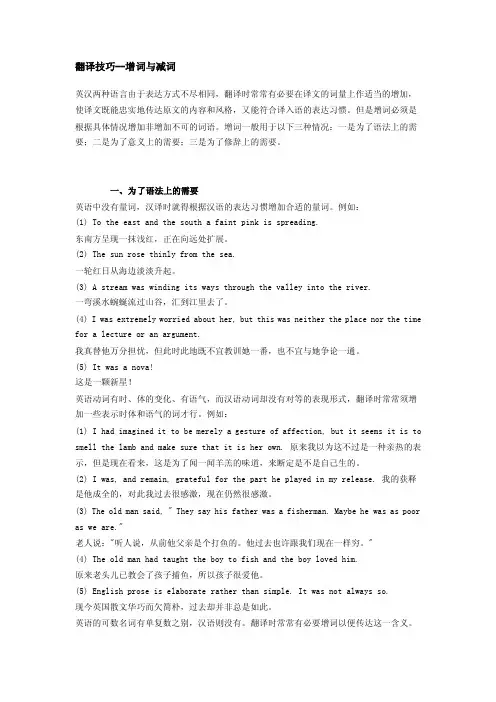
翻译技巧--增词与减词英汉两种语言由于表达方式不尽相同,翻译时常常有必要在译文的词量上作适当的增加,使译文既能忠实地传达原文的内容和风格,又能符合译入语的表达习惯。
但是增词必须是根据具体情况增加非增加不可的词语。
增词一般用于以下三种情况:一是为了语法上的需要;二是为了意义上的需要;三是为了修辞上的需要。
一、为了语法上的需要英语中没有量词,汉译时就得根据汉语的表达习惯增加合适的量词。
例如:(1) To the east and the south a faint pink is spreading.东南方呈现一抹浅红,正在向远处扩展。
(2) The sun rose thinly from the sea.一轮红日从海边淡淡升起。
(3) A stream was winding its ways through the valley into the river.一弯溪水蜿蜒流过山谷,汇到江里去了。
(4) I was extremely worried about her, but this was neither the place nor the time for a lecture or an argument.我真替他万分担忧,但此时此地既不宜教训她一番,也不宜与她争论一通。
(5) It was a nova!这是一颗新星!英语动词有时、体的变化、有语气,而汉语动词却没有对等的表现形式,翻译时常常须增加一些表示时体和语气的词才行。
例如:(1) I had imagined it to be merely a gesture of affection, but it seems it is to smell the lamb and make sure that it is her own. 原来我以为这不过是一种亲热的表示,但是现在看来,这是为了闻一闻羊羔的味道,来断定是不是自己生的。
(2) I was, and remain, grateful for the part he played in my release. 我的获释是他成全的,对此我过去很感激,现在仍然很感激。
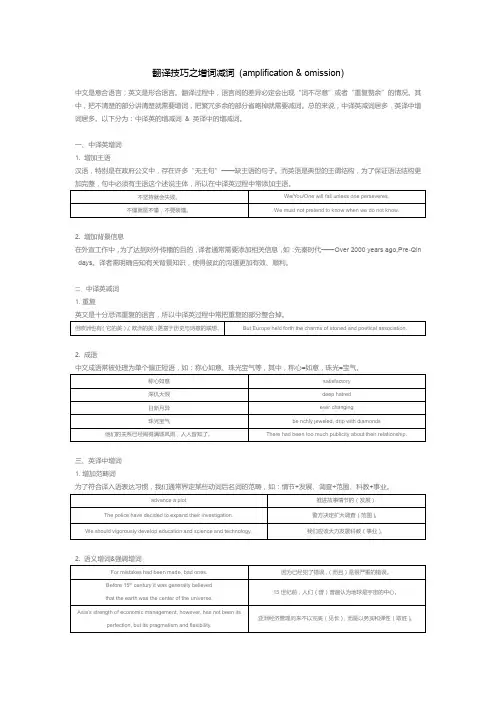
翻译技巧之增词减词(amplification & omission)
中文是意合语言;英文是形合语言。
翻译过程中,语言间的差异必定会出现“词不尽意”或者“重复赘余”的情况。
其中,把不清楚的部分讲清楚就需要增词,把繁冗多余的部分省略掉就需要减词。
总的来说,中译英减词居多,英译中增词居多。
以下分为:中译英的增减词& 英译中的增减词。
一、中译英增词
1. 增加主语
汉语,特别是在政府公文中,存在许多“无主句”——缺主语的句子。
而英语是典型的主谓结构,为了保证语法结构更加完整,句中必须有主语这个述说主体,所以在中译英过程中常添加主语。
2. 增加背景信息
在外宣工作中,为了达到对外传播的目的,译者通常需要添加相关信息,如:先秦时代——Over 2000 years ago,Pre-Qin days。
译者需明确告知有关背景知识,使得彼此的沟通更加有效、顺利。
二、中译英减词
1. 重复
2. 成语
中文成语常被处理为单个偏正短语,如:称心如意、珠光宝气等,其中,称心=如意,珠光=宝气。
三、英译中增词
1. 增加范畴词
为了符合译入语表达习惯,我们通常界定某些动词后名词的范畴,如:情节+发展、调查+范围、科教+事业。
2. 语义增词&强调增词
其中,第2例是语义性增词,“曾”表现了英语原文中“was” 的时态含义;第1例及第3例则是为了使得译文更加通顺地道,或是表强调对比。
四、英译中减词
1. 减去功能性虚词
英语中有许多起语法功能的虚词:冠词、代词、介词,它们通常融合在了其他词语之中,所以在英译汉过程中为了行文。
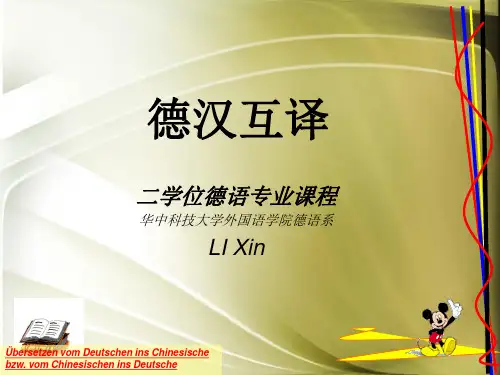
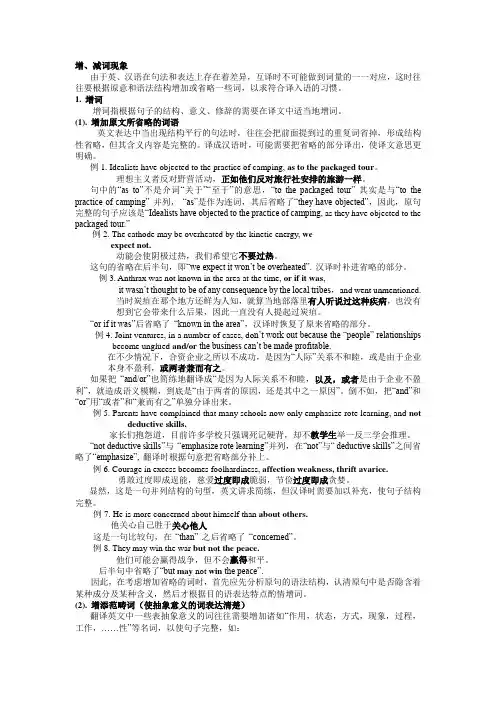
增、减词现象由于英、汉语在句法和表达上存在着差异,互译时不可能做到词量的一一对应,这时往往要根据原意和语法结构增加或省略一些词,以求符合译入语的习惯。
1. 增词增词指根据句子的结构、意义、修辞的需要在译文中适当地增词。
(1). 增加原文所省略的词语英文表达中当出现结构平行的句法时,往往会把前面提到过的重复词省掉,形成结构性省略,但其含义内容是完整的。
译成汉语时,可能需要把省略的部分译出,使译文意思更明确。
例1. Idealists have objected to the practice of camping, as to the packaged tour。
理想主义者反对野营活动,正如他们反对旅行社安排的旅游一样。
句中的“as to”不是介词“关于”“至于”的意思,“to the packaged tour” 其实是与“to the practice of camping” 并列,“as”是作为连词,其后省略了“they have objected”,因此,原句完整的句子应该是“Idealists have objected to the practice of camping, as they have objected to the packaged tour.”例2. The cathode may be overheated by the kinetic energy, weexpect not.动能会使阴极过热,我们希望它不要过热。
这句的省略在后半句,即“we expect it won’t be overheated”. 汉译时补进省略的部分。
例3. Anthrax was not known in the area at the time, or if it was,it wasn’t thought to be of any consequence by the local tribes,and went unmentioned.当时炭疽在那个地方还鲜为人知,就算当地部落里有人听说过这种疾病,也没有想到它会带来什么后果,因此一直没有人提起过炭疽。
语言翻译中的增词与减词有人误以为,所谓合乎翻译标准,就是在把一种语言转换为另一种语言时,做到“不增不减”。
北京翻译公司告诉我们,由于两种语言表达方式上存在差异,翻译时往往都是“既增又减”。
这种根据各自语言特点,在具体上下文中适当地“增、减”,就是我们所要讨论的翻译技巧。
词量增减,是指根据原文上下文的意思、逻辑关系以及译文语言句法特点和表达习惯,在翻译时增加原文字面没有出现但实际内容已包含的词,或者减去原文虽有但译文语言表达用不着的词。
必须指出的是,词量增减必须防止两个倾向:一是添枝加叶,任意发挥;二是避难就易,肆意裁割。
1、增词增词,从理论上说可以增加任何词,但在什么时候增加什么样的词,才能恰到好处,而不超出一定界限,则需要悉心体会。
下面试分析几个译例:1)A book, tight shut, is but a block of paper.译文一:一本书,紧紧合上,只是一叠纸。
译文二:一本书,如果紧紧合上不读,只是一叠纸。
译文三:一本书,如果紧紧合上不读,只是一叠废纸。
译文四:闲置之书只是一叠废纸。
上面同一个句子四个译文,可以体现翻译不同层次。
译文一,与原文似乎丝丝入扣,但却显得支离破碎、关系不清、语意不足;译文二,增加了“如果……不读”,意思明白无误,只是觉得言犹未尽;译文三,又增加了一个废字,这可是点睛之举。
能否译出这个废字,是翻译这个句子的关键。
一个废字,说话者语意才得以充分表达。
译文三不足之处,就是行文拖沓累赘;而译文四则简明扼要,笔酣墨浓了。
2)Success is often just an idea away.译文一:成功往往只是一个念头的距离。
译文二:成功往往只是一念之差。
译文三:成功与否往往只是一念之差。
译文一让人看后莫名其妙;译文二改变说法,但仍让人似懂非懂,而译文三只是简简单单增加了一个“与否”,但却使人豁然开朗!原句意思表达得淋漓尽致。
如同文学翻译一样,经贸文字翻译增词现象也是千变万化。
第2章增词和减词增词1,根据句法结构增词(1)增补主语不加持就会失败One will fail unless one preserves.(2)增补非人称的或强势中的it一天天冷起来了。
It is getting colder day by day.我们费了很大力气才解决了那些问题。
It was with great effort that we solved those problem.(3)增补作宾语的代词或先行宾语it他越是要掩盖他的烂疮疤,就越会暴露。
The more he tried to hide his warts, the more he revealed them.我们认为理论与实践相结合是十分重要的。
We think it most important that theory should be combined with practice.(4)增补物主代词别把手搁在口袋里。
Don’t put your hands in your pockets.(5)增补并列连词男女老少都参加了战斗。
Men and women, old and young, all joined in the battle.(6)增补丛属连词或关系代词不努力,不会成功One will not succeed unless one works hard.凡是在科学技术上有建树者,都是工作最勤奋,并且勇于创新的人。
Those who made original contributions to science and technology are the ones who have worked the hardest and have not been afraid to break new ground.(7)增补连系动词我们应当虚心One should always be modest.(8)增补介词公共场所不准吸烟。
Smoking is prohibited in public places.(9)增补冠词月亮慢慢从海上升起。
The moon was slowly rising above the sea.2. 为了明确表达原文的含义而增词(1) 增补在汉语中不言而喻的词语A班学习成绩很好The students in Class A have won a brilliant academic record. (2) 为了使上下文衔接,增补连接词语李先生病了,我们的找个人代替他。
Mr. Li fell ill, thus making it necessary for us to find a substitute for him.3 为了适应句子的逻辑要求而增词其实地上本没有路,走的人多了,也便成了路。
For actually the earth had no roads to begin with, but when many men pass one way, a road is made.减词英译时汉语里重复的词语,一般只需译一个。
青年人的觉醒程度如何,道德品质如何,知识水平如何,直接关系者社会主义建设的速度,关系着国家的未来。
How the youth come up in political consciousness, in moral qualities and in intellectual attainments has a direct bearing on the speed of socialist construction and the future of our motherland.译不来的句子:1.重点是普及义务教育,积极发展职业教育和成人教育,适度发展高等教育,优化教育结构。
We must lay emphasis on making compulsory education universal, vigorously developing vocational education and adult education, moderately developing higher education and optimizing educational structure.2.把钟拆开比把它装起来容易。
It is easier to take a clock apart than to put it together again.3..我们这样做都是为了你好。
It was for your benefit that we did it all.4.他走进屋来,大衣上尽是雪,鼻子冻得通红。
He entered the room, his coat covered with snow and his nose red with cold.5一年之计,莫若树谷;十年之计,莫若树木;百年之计,莫若树人。
(《管子·权修篇》)佳译:If you plant for one year, plant a seed. If for ten years, plant a tree. If for a hundred years, teach the people.6.时光流逝太快,还没有很好地一览风光,怎么就入了秋境了呢?便觉得有三分惆怅,三分无奈。
参考译文:A touch of downcastness and helplessness came over me as I realized how time had flown. Before I could sufficiently admire the scenery and enjoy the beauty of life, it was already autumn.(惆怅和无奈不会翻译,还有一览风光)7.青年人的觉悟程度如何,道德品质如何,知识水平如何,直接关系着社会主义建设的速度,关系着祖国的未来。
参考译文:How the youth comes up in political consciousness, in moral qualities and in intellectual attainments has a direct bearing on the speed of socialist construction and the future of our motherland.(不知道这里的如何怎么翻译)8.必须认识到,如果只讲物质利益,只讲金钱,不讲理想,不讲道德,人们就会失去共同的奋斗目标,失去行为的正确规范。
参考译文:We must realize that we would lose the common objective of struggle and the accepted code of conduct if we only value material gains and money without thinking of ideals and moral standards.(这里的“讲”是“追求,重视”的意思) 译不好的句子:1..不坚持就会失败自己译文:One will fail without perseveres.课本译文:One will fail unless one perseveres.2.尝试而失败还是比不尝试好。
自己译文:It is better to try and fail than never try.课本译文:It is better to try and fail than never try at all.3.我们费了很大力气才解决了那些问题。
自己译文:It took us great effort to solve those problems.课本译文:It was with great effort that we solved those problems.4.他越是要掩盖他的烂疮疤,就越是会暴露。
自己译文:The more hi tried to hide his warts, the more they were exposed课本译文:The more he tried to hide his warts, the more he reveled them5.男女老少都参加了战斗。
译文:All the people were in the war.佳译:Men and women, old and young, all joined in the battle.评价: 自己的译文不能具体强调出“男女老少”。
6.凡是在科学技术上有建树者,都是工作最勤奋,并且勇于创新的人。
译文:If one wants to succeed in science and technology, he has to be the one who works the hardest and has a creative heart.佳译:Those who have made original contributions to science and technology are the ones who have worked the hardest and have not been afraid to break new ground.评价:自己有漏译之处,原句中的“勇于”就没有翻译出来,还有译得不到位的,比如“建树”,结合整个句子,不仅仅是表示“成功”,还要蕴含着“开拓创新”的意思。
7.我们对问题要做全面的分析,才能解决得妥当。
译文:We should make a thorough analysis of the problem so that it can be solved properly.佳译:We must make a comprehensive analysis of a problem before it can be properly solved.评价:翻译时我用了the problem, 原译中用的是a problem, 表示泛指还是用不定冠词比较好些。
在连词的选用上我用的是表结果的so that而原译用的是表时间的before,因为so that 用得太频繁,所以我觉得用before倒显得新颖一些。
8.窝藏不报者,须受相当的处分。
译文:If one who shelters the bad things and doesn’t report, he would be punished. 佳译:Persons who shelter undesirable elements and do not report them to the authorities concerned shall be duly punished.评价:这句话需要进行增词,而我没有增补完全,比如说“报”就应该蕴含了“向有关当局报告”这个宾语,所以还应该增补authorities concerned。